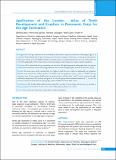Please use this identifier to cite or link to this item:
https://hdl.handle.net/20.500.14356/934Full metadata record
| DC Field | Value | Language |
|---|---|---|
| dc.contributor.author | Dahal, Samarika | - |
| dc.contributor.author | Agrawal, Nitin Kumar | - |
| dc.contributor.author | Chaulagain, Tekendra | - |
| dc.contributor.author | Gosain, Nabin | - |
| dc.contributor.author | Natarajan, Srikant | - |
| dc.date.accessioned | 2023-04-06T09:09:34Z | - |
| dc.date.available | 2023-04-06T09:09:34Z | - |
| dc.date.issued | 2022 | - |
| dc.identifier.citation | DahalS., Agrawal N. K., ChaulagainT., GosainN., & Natarajan S. (2023). Application of the London Atlas of Tooth Development and Eruption in Panoramic Xrays for the Age Estimation. Journal of Nepal Health Research Council, 20(3), 605-610. https://doi.org/10.33314/jnhrc.v20i3.4311 | en_US |
| dc.identifier.uri | http://103.69.126.140:8080/handle/20.500.14356/934 | - |
| dc.description | Original Article | en_US |
| dc.description.abstract | Abstract Background: The age estimation of the individual by the forensic experts ascertains the chronological age of an individual. The possibility that the person being examined may be younger or older than a certain age threshold makes this process crucial, as it will establish whether or not the person is an adult under the law. The aim of this study was to test the applicability of the London Atlas of tooth development and eruption in Nepalese subset population. Methods: The London Atlas for age estimation was tested in 350 digital panoramic radiographs from the patients between four and twenty-four years visiting Tribhuvan University Teaching Hospital, Institute of Medicine, Nepal. Results: The mean values of the estimated age were higher in both the sexes, which was statistically not significant. Both the sexes showed an excellent positive correlation, and was significant with a p value of <0.001. The age estimation upto 10 years group classification was nearly accurate with less than 1 and 2.5 years variation in males and females respectively. The accuracy was good in 16-18 years group with maximum deviation of ±2.5 years. The accuracy was poor in more than 18 years group, as the variability was more than 5 years. Conclusions: The London Atlas method was best suited for less than 18 years of age and was not very accurate in the age group of 13-14 and 14-15 years where most of the polymorphisms were noted. Keywords: Dental age estimation; London Atlas; Nepalese population. Author Biography Srikant Natarajan , Department of Oral Pathology& Microbiology, Manipal College of Dental Sciences, Mangalore, Manipal Academy of Higher Education. | en_US |
| dc.language.iso | en | en_US |
| dc.publisher | Nepal Health Research Council | en_US |
| dc.relation.ispartofseries | July-Sep, 2022;4311 | - |
| dc.subject | Dental age estimation | en_US |
| dc.subject | London Atlas | en_US |
| dc.subject | Nepalese population | en_US |
| dc.title | Application of the London Atlas of Tooth Development and Eruption in Panoramic Xrays for the Age Estimation | en_US |
| dc.type | Journal Article | en_US |
| Appears in Collections: | Vol 20 No 3 Issue 56 july-Sep, 2022 | |
Files in This Item:
| File | Description | Size | Format | |
|---|---|---|---|---|
| 4311-Manuscript-30764-1-10-20230314.pdf | Fulltext Article. | 379.37 kB | Adobe PDF |  View/Open |
Items in DSpace are protected by copyright, with all rights reserved, unless otherwise indicated.
